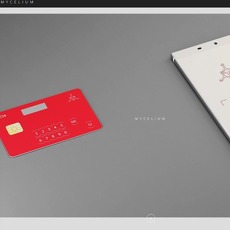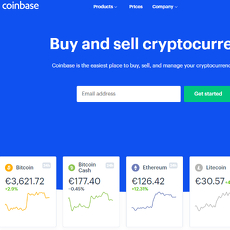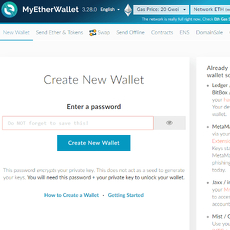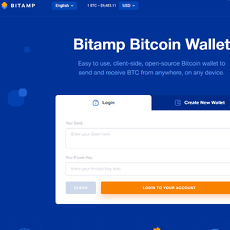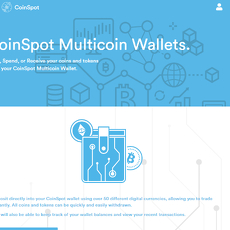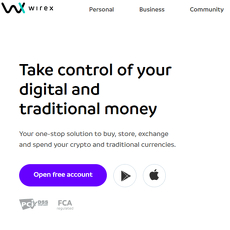CoinJar Wallet Review
CoinJar Wallet
www.coinjar.com
CoinJar Wallet Review Guide: Your Ultimate 2025 Crypto Storage Test
Are you losing sleep asking yourself, “Is CoinJar Wallet where I should keep my crypto safe?” You’re not alone. Every week there’s a new story about someone losing access to their digital coins or getting hit by a hack. Picking the wrong crypto wallet doesn’t just cost you time—it can cost you everything. So, how do you actually find a wallet that’s worth your trust in 2025?
The Tough Part About Picking the Right Crypto Wallet
Let’s face it—scrolling through endless wallet options, unboxing wild claims like “most secure” or “easiest to use,” is exhausting. The crypto industry has exploded with more wallets than ever, but so have risks:
- Phishing attacks are up over 40% in the last two years, according to recent Chainalysis reports.
- Millions lost from wallets with weak security or poor backup options.
- So-called wallet “innovations” often overpromise and underdeliver when you need actual support or security.
I get inbox messages from readers every day, telling me about wallets that took forever to process withdrawals, got locked after basic updates, or disappeared overnight. I don’t want that for you.
I’ll Show You How to Find a Wallet That Works for You (And Keep Your Coins Safe)
I know how tough the choice can be, but there’s a smarter way to handle it. Here’s exactly what I’m going to do for you in this guide:
- Explain how wallets work (in real-world, plain English).
- Lay out what actually makes a wallet secure or convenient, backed by hands-on experience—not just marketing fluff.
- Research CoinJar Wallet up close, including everything users love and what you should watch out for.
- Set you up with honest answers to the questions people are flooding Google with, like “Is CoinJar really safe?” and “How does it compare to a Ledger or Coinbase Wallet?”
- Keep things focused, friendly, and super practical—so you can make a smart move without a wallet disaster hanging over your head.
Why Trust My Review?
I know it’s hard to cut through paid reviews and fake hype. I’ve personally tested and reviewed dozens of crypto wallets using real money, keeping only the standards I’d trust with my own coins. Here’s a snapshot of how I test wallets:
- Security: Everything from two-factor auth to cold storage, because hacks are always lurking.
- Supported coins: If a wallet only lets you store three tokens, it’s just a glorified BTC locker.
- Ease of use: From mobile logins to managing addresses, how smooth (or stressful) is it?
- Support: Because, trust me, when something goes wrong you want a team that actually answers.
Every review pulls from my own headaches and wins. No sugarcoating, no random 5-star ratings. If there’s a weak point, you’ll hear about it—before you make a decision you’ll regret later.
Ready to finally understand which wallet fits your style and keeps your coins safe? Great—stick with me. Next I’ll show you exactly how crypto wallets really work, what makes them tick (and fail), and why understanding wallets is everything before you risk a single satoshi or alt.
Curious what actually makes a wallet “secure” in the first place—or why some wallets get hacked and others don’t? Keep reading and you’ll get the no-BS answers you deserve.
What Are Cryptocurrency Wallets (and Why Do They Matter)?
Let’s set the stage: imagine holding your own digital bank vault in your pocket—exciting stuff, but also a bit intimidating, right? Every time I talk to new crypto users, there’s this same nervous mix of curiosity and worry. A common fear is, “If I mess this up, am I just going to lose everything?” That’s exactly why understanding what a cryptocurrency wallet actually does is non-negotiable. It’s not just a trend; it’s the gateway to real financial control… or, if you’re not careful, serious risk.
What is a Cryptocurrency Wallet?
Let’s cut through the jargon. A “cryptocurrency wallet” isn’t a wallet in the way you’d picture your leather billfold; instead, it’s a tool (software, hardware, or paper) that lets you store, send, and receive crypto by managing your private keys. Think of the private key as your super-secret PIN—whoever has it, has full access to your coins.
So here’s the big truth: you never actually “store” coins in the wallet itself. The blockchain always holds the coins; your wallet gives you the keys to unlock and control them. Lose those keys, and, as some users on Reddit have heartbreakingly shared, you lose the coins forever. Ouch.
Types of Wallets: The Basics
Here’s a no-BS breakdown of the usual suspects. Each comes with trade-offs, so the right pick depends on what you value most:
- Software Wallets – These live on your phone, computer, or the web. They’re super handy, letting you check balances on your commute or transfer funds on the fly. But convenience usually means your keys are exposed to online threats, so you better trust the team behind the software.
- Hardware Wallets – Picture a tiny USB device (like Ledger or Trezor). Your private keys never touch the internet, which makes these favorites for long-term holders or anyone prioritizing security. Studies, like one from the University of Cambridge, back up that hardware wallets dramatically reduce theft risk.
- Paper Wallets – Print your keys on paper and store them offline. This might sound old-school—because it is. One spill, fire, or forgetful moment and your crypto history is toast. But for some, ultimate control (and zero digital trace) matters more than everyday access.
Each wallet type has fans and critics. The key question to ask yourself: What’s more important right now—speed, ease, or top-tier security?
Choosing a Wallet: What Should You Look For?
It’s easy to get distracted by shiny logos or “number one” claims, but here’s my checklist after years of testing wallets:
- Security Features – Look for things like two-factor authentication, open-source code, and strong encryption.
- Supported Coins – Does it only store Bitcoin, or will it handle Ethereum, stablecoins, and your favorite tokens?
- Ease of Use – If it feels confusing or clunky, you’re less likely to use it… and more likely to make mistakes.
- Accessibility – Do you want access from mobile, desktop, or both? Some wallets cover all bases, others zero in on one.
- Update Frequency – Frequent, transparent updates mean the project cares about your security (and isn’t stuck in 2018).
- Extra Features – Some wallets add perks like in-app swaps, debit cards, or spending analytics. Only you can say if that’s a must-have or a distraction.
Every wallet choice is a balancing act. It’s not always simple, but it’s worth the effort. As I often remind readers through my guides: "Don’t trust, verify—research is your best protection."
A Real-World Example: Resources Worth Checking
If you're itching to nerd out or just want peace of mind, never skip the research phase. A good starting point is always a dedicated crypto wallet review page that explains pros and cons honestly (shameless plug, yes, but also, that's why it exists). Dig into third-party audits, developer transparency, and real user reviews—these are goldmines. Trust is earned in crypto, not given, as too many headlines about lost funds prove every month.
“The bitterness of poor security remains long after the sweetness of convenience is forgotten.”
If choosing a crypto wallet sounds complicated, that’s because it can be. But, what if there was a wallet that tried to find the perfect balance between security, simplicity, and features—could it actually work for your everyday crypto life? That’s exactly what I’ll be taking a close look at next. So, is CoinJar Wallet that rare find, or just another “almost but not quite?” Let’s keep going and see what we uncover.
CoinJar Wallet Overview: How Does It Stack Up?
Time to get real about CoinJar Wallet—the promises, the real-world user experience, and whether this is actually the spot for your crypto. Here’s where theory meets practice:
Background: Who’s Behind CoinJar?
CoinJar burst onto the Australian crypto scene back in 2013—practically ancient history in crypto years. Founded by Asher Tan and Ryan Zhou, it’s now one of the longest-running crypto exchanges and wallets in Australia (and yes, it’s expanded to the UK and Europe too).
Why does that matter? Track record actually means something in crypto. Would you trust your coins to a brand-new startup with zero history? CoinJar’s longevity is worth noting, especially in a space where many platforms vanish almost as quickly as they arrive.
Supported Cryptocurrencies and Features
So, what can you actually do with CoinJar Wallet? Let’s look under the hood:
- Coins Supported: You can hold Bitcoin, Ethereum, Litecoin, Ripple, Chainlink, and more—over 50 coins as of today, with new tokens added pretty regularly based on community demand.
- In-App Trading: No need to move your coins elsewhere to buy or swap; CoinJar’s in-app exchange lets you go from ETH to BTC (or vice-versa) fast and without drama.
- CoinJar Card: This is a big one. You get a free Mastercard debit card—yep, spend your Bitcoin or Ethereum in stores, online, or withdraw AUD from ATMs just like regular cash. It’s crypto’s answer to “Hey, when can I actually buy lunch with this stuff?”
- Portfolio Tracking and Tax Reports: See your crypto’s performance, profits, and losses in one place. Plus, CoinJar generates tax reports for the boring (but important) side of investing.
- Instant Buy Options: Use your bank account, PayID, or even credit/debit cards to buy crypto. It’s set up for beginners, but advanced users appreciate the speed too.
Don’t just take my word for it—a 2023 Finder study put CoinJar among Australia’s top platforms for beginners, mainly for its clean interface and features like instant trades and the debit card. It’s clearly built for people who want to do more than just “hodl.”
Security & Safety
Let’s cut through the marketing noise. Is CoinJar actually secure? Here’s what’s really going on behind the scenes:
- Two-Factor Authentication (2FA): Turn it on, always. Whether you’re holding $10 or $10,000, it’s an absolute must.
- Encryption: CoinJar claims bank-level encryption for all sensitive data (not just your passwords, but anything that could expose your identity or funds).
- Hot/Cold Storage Mix: The majority of crypto is held offline (cold storage). Only a small portion stays online to process transactions, which is best practice for minimizing risk.
- Custodial Model: CoinJar is a custodial wallet. That means they safeguard your private keys. For complete control freaks, this can be a dealbreaker (more on that in the pros & cons below).
- Track Record: As I write this, CoinJar has never suffered a major hack that led to lost user funds—a claim not every platform can make.
“In crypto, you don’t rise to the occasion—you fall to the level of your security practices.”
If you’re after peace of mind, it helps knowing CoinJar’s full registration with AUSTRAC and FCA supervision in the UK. It’s one of the few wallets I’ve reviewed that takes regulation this seriously (for better or worse, depending on your views).
Ease of Use: What’s the User Experience Like?
This isn’t one of "those" platforms where you feel like you need a computer science degree just to send Bitcoin. Creating an account is straightforward. Verifying your identity takes a few minutes. The dashboard? Super clear, even for first-timers. Want to send crypto to another wallet or bank? A few taps and you’re sorted.
The mobile app is probably where CoinJar shines. I’ve tested it on both Android and iPhone. Everything’s quick, clean, and—most importantly—fast. I rarely see lag between opening the app and seeing my balance update after a transaction (unlike a few others I won’t shame here). Even if you’re new to crypto, you won’t feel out of your depth.
Pros & Cons: What I Really Like (and Don’t)
- What’s Great:
- Super easy for beginners, but enough features for serious traders
- Free Mastercard debit card—spend your crypto like cash
- Strong history of security & regulation
- Clean app that doesn’t crash or confuse
- Supports most major coins and quick AUD/GBP deposits & withdrawals
- Room for Improvement:
- It’s custodial—you’re trusting CoinJar with your coins
- Still missing support for smaller/obscure altcoins
- Available mainly to Australia and UK/Europe. Americans: you’re out of luck (for now)
- No direct staking from within CoinJar (though they’ve hinted at future plans)
In crypto, every wallet has its baggage. The real question is: does CoinJar’s mix of convenience, security, and features fit what you want out of a crypto wallet?
Of course, picking a wallet is only half the battle. What you really want to know is—how does CoinJar actually measure up against the giants like Coinbase, Exodus, or the cold, hard security of hardware wallets like Ledger? That comparison is coming up next, and honestly, the differences are bigger than you might expect. Want to see which one could make (or break) your crypto experience? Stick with me, you’re about to find out.
How Does CoinJar Compare to Other Wallets?
With so many crypto wallets popping up these days, I totally get wanting to see how CoinJar stands out — or falls behind. You’re not just looking for a safe place to hold your crypto; you want convenience, real usability, and peace of mind. Nobody wants to wake up to a nightmare scenario where their coins are missing or stuck in some half-baked app.
CoinJar vs Software Wallets (Coinbase, Exodus, and Friends)
Let’s start with what’s closest: other well-known software wallets. I’ve spent time with most of the big brands, and here’s what I’ve noticed when stacking up CoinJar:
- Accessibility: CoinJar’s mobile app is clean, fast, and doesn’t overwhelm new users—think less “stock chart overload” and more “simple, slick banking app.” It’s reminiscent of Coinbase’s basic interface, but smoother for quick everyday transactions.
- Supported Coins: Honestly, CoinJar supports fewer assets than Exodus or Coinbase. If you’re the type chasing dozens of trending tokens, you’ll feel that pinch. But if you mostly use Bitcoin, Ethereum, or a few large-cap coins, you’ll barely notice.
- Extra Features: Here’s where CoinJar is sneaky-good: local buy/sell options (especially in Australia and the UK), CoinJar Card for spending crypto instantly, and slick integration with local banking. Many “global” wallets make you feel lost outside the US, or they bury you in fees.
- Security: 2FA, industry-standard encryption, and account insurance for Aussie users—pretty solid for a software wallet. But you’re still trusting their servers, so if you’ve read any exchange hack stories (as Chainalysis research shows, these accounted for over $2 billion lost in 2022 alone), you know why some folks get nervous.
If simplicity and living in their supported regions are your priority, CoinJar feels light and fast. But if you’re a power user or a true “altcoin hunter,” Exodus or Coinbase will give you more options to tinker with—just be ready for more bells and whistles (and sometimes, headaches).
CoinJar vs Hardware Wallets (Ledger, Trezor, and the Offline Crowd)
Let’s be honest—nothing beats the “cold storage” peace of mind you get with a true hardware wallet. The second you move your Bitcoin to a Ledger, it’s offline and basically unhackable (unless you lose your recovery phrase or buy a wallet from a shady source—crazy but it happens).
- Why pick a hardware wallet? You’re in control. Your coins aren’t sitting on a company’s server. You’re shielded from online hacks.
- Trade-offs: Spending with Ledger or Trezor can feel like using a safe buried in your backyard. Great for long-term storage but not-so-fun for frequent trading, instant access, or crypto debit cards. Want to buy coffee with Bitcoin? You’ll end up transferring in and out often, and there’s always a slight learning curve for beginners.
CoinJar’s edge here is convenience. Think of it as the wallet you use for pocket money, quick trades, or spending—then keep your “life savings” tucked away on your hardware device. It’s honestly what a lot of crypto pros (and security freaks) do.
“The key to long-term crypto safety isn't picking a single wallet—it's knowing how to split your risk.”
Geography & Accessibility: Who Actually Gets to Use CoinJar?
This one matters way more than most review sites tell you upfront. CoinJar is a bit of a local hero: they’re a big name in Australia, and they’ve properly expanded to the UK. If you’re outside those zones, your access is limited—no matter how shiny their features look. Compared to broader wallets like Exodus or Coinbase, which operate (legally or not) in dozens of countries, that’s a real restriction.
Try creating a CoinJar account in the US, Canada, or parts of Asia and you’ll hit a wall. Not a dealbreaker for everyone, but a harsh wakeup if you’re planning moves or working globally. Always check their current list of supported countries (rules change fast in crypto).
When Might CoinJar Not Be Your Best Bet?
Let’s cut through the marketing—CoinJar just isn’t perfect for every scenario:
- Altcoin collectors: Hunting little-known DeFi tokens or NFTs? You’ll miss out.
- Living outside Australia or the UK: The app simply isn’t available to you.
- Security maximalists: If you want true cold storage and total control, hardware is still king.
- Frequent global transaction needs: Sometimes, exchange-supported software wallets cover more ground and more coins.
If you want a crypto wallet that “just works,” and your region is supported, it’s hard not to appreciate how streamlined CoinJar is. But everyone has different priorities. What matters most to you? Security? Range of coins? Easiest spending experience? If you’ve got really unusual needs, you’ll probably want to balance CoinJar against a more specialized tool.
Now, here’s the kicker: People keep asking about CoinJar’s safety, supported coins, and those sneaky little fees. Curious what’s true and what’s a rumor? Coming up next—I’ll answer the real, nitty-gritty questions everyone wants to know. Ever wondered if your funds are truly protected with CoinJar? Stick with me, because next I’ll clear up the confusion and share what nobody else is telling you.
CoinJar Wallet: FAQ & Answers (What People Are Asking Online)
Let’s be real: if you’re on the hunt for a new crypto wallet, you want quick, no-fluff answers to the burning questions. Based on what people are asking online, here’s what you actually need to know about CoinJar Wallet—broken down in simple language, with clear takeaways to help you make smart moves.
Is CoinJar Wallet Safe?
Security is the number one thing on most users’ minds, and for good reason. CoinJar employs industry-standard stuff like two-factor authentication (2FA), data encryption, and some cold-storage practices (meaning, a lot of their customers’ assets are stored offline for safety). They also require identity verification to reduce fraud.
So far, CoinJar’s security record hasn’t had the kind of bombshell hacks you see on the news, which is a positive sign. That said, the truly safest crypto wallets are always the ones you control—think hardware wallets or custodial services with insurance. CoinJar does not insure every user deposit (it’s not a bank, after all) but does take active steps to keep funds safe. Your job? Use strong passwords, enable all security settings, and never share your details with anyone. If you’re not sure about security best practices, check out this best wallets guide for a quick primer.
Which Coins Can I Store on CoinJar?
This is a common question, especially if you’re not sticking to just Bitcoin or Ethereum. As of now, CoinJar supports:
- Bitcoin (BTC)
- Ethereum (ETH)
- Litecoin (LTC)
- Ripple (XRP)
- USD Coin (USDC) and Tether (USDT)
- Dogecoin, and several others
They do add new assets occasionally, but it’s not as fast as some wallets or exchanges. The best way to get the latest is to hit their official site or app, since support can change anytime. If you want to store niche altcoins, you might need another wallet as a backup.
Is CoinJar a Wallet or an Exchange?
Trick question—it’s actually both! CoinJar acts as a digital wallet for holding your crypto, but it also lets you buy, sell, and swap assets directly inside the app or on the web. This makes it a good hybrid solution (wallet + trading spot), but remember: any service connected to the internet always carries some risk. For buy-and-hold investors, you might want to store big long-term balances in a separate, offline wallet.
How Do I Withdraw Funds from CoinJar?
Withdrawing is pretty straightforward, whether you’re cashing out to your bank or sending coins to another wallet. Here’s how it usually works:
- Open your CoinJar account (app or web).
- Choose the crypto you want to withdraw or select your fiat balance (AUD/GBP, for example).
- Enter the recipient address (for crypto) or your bank details (for fiat).
- Set the amount, double-check all details, and confirm.
Expect a few minutes for most crypto withdrawals (speed depends on network traffic), and up to 1-3 business days if you’re withdrawing to a bank account. There may be fees—either a flat withdrawal fee for crypto, or a small cost built into fiat transactions. Exact fees are always on their official fee schedule.
Who Can Open a CoinJar Account? Are There Country Restrictions?
CoinJar started out serving Aussies and the UK crowd, and while they’ve expanded a bit, they’re still limited to certain regions because of local regulations. As of now, CoinJar is available for:
- Australia
- United Kingdom
Other regions may be added in the future, but if you’re outside these countries, you’ll need to look elsewhere. Double-check the signup page for the most current info—country access can change due to rules and licensing stuff.
How Does CoinJar Make Money?
Great question! Like almost every cryptocurrency platform, CoinJar makes money by charging fees and “spreads” (the gap between buy and sell prices). Their fee structure covers:
- Trading/buy-sell fees (typically around 1%)
- Card fees (if using CoinJar Card)
- Deposit/withdrawal fees for certain methods or fast processing
This isn’t unique—exchanges need to pay their bills! But it’s still something to watch out for, as these costs can add up if you’re an active trader. Always look for the latest numbers in their official fee section.
Other Common Questions and Support Info
Confused about something else? Want to know what happens if you forget your password or need fast support? CoinJar has an online help center with FAQs (support.coinjar.com) and a ticket system for real issues. Most questions get a response within a business day, but for urgent matters, they suggest tweeting them (@CoinJar) or using their in-app help.
Still curious about whether CoinJar is the right wallet for your crypto journey, or wondering if there’s an even better fit out there? Stick around for the next part where I’ll unpack who's really going to benefit from CoinJar…and offer some extra wallet tips I wish someone told me earlier. Ever wondered how seasoned crypto users dodge common wallet mistakes? I’ll let you in on their secrets next.
Should You Use CoinJar Wallet? Final Thoughts & Recommendations
Alright, here’s the real question: Is CoinJar Wallet worth a spot in your crypto toolkit? If you’ve made it this far, you probably have a good feel for what CoinJar brings to the table, and what it doesn’t. But let’s break it down so you can decide for yourself — without the crypto FOMO or shiny marketing hype.
Who Should Pick CoinJar?
I’ll be straight with you: CoinJar hits a pretty sweet spot for certain crypto users, but it won’t be the “forever wallet” for everyone. Here’s who I think will get the most out of it:
- Crypto Beginners: If you’re just starting out and want a wallet that’s easy to set up, hassle-free to use, and doesn’t throw technical jargon in your face, CoinJar is honestly hard to beat. The onboarding flow, support, and clean app design knock it out of the park for people who want to buy, sell, and store mainstream coins without getting lost.
- Regular Traders in Supported Countries: If you’re in Australia or the UK — where CoinJar really focuses its services — and you want to swap between coins or move funds quickly, it just works. The in-app trading, direct AUD and GBP bank withdrawals, and the debit card feature are super practical for anyone who treats crypto like regular money.
- People Who Don’t Want Custody Stress: If the thought of managing private keys, seed phrases, and self-custody wallets gives you anxiety, CoinJar’s managed (custodial) solution means you won’t lose sleep over backups. They take on the security side so you can focus on using your crypto.
But — and it’s a big but — if you want to hold less common tokens, live outside their main regions, or you care deeply about having full control of your keys, then CoinJar probably isn't your dream wallet.
Alternatives and My Extra Tips
If you read all this and you’re thinking, “Actually, I want something different,” that’s perfectly normal. Here are a couple of go-tos to consider (with a quick note on why):
- Exodus and Trust Wallet: If you want lots of supported coins, total control, and a slick mobile experience, these are top picks. Just remember, you control the keys. Lose your seed phrase — game over.
- Ledger and Trezor: If you’re parking serious money long-term, hardware wallets are the safest way. Yes, it’s a little more work (setting up, physically storing the device), but security wise, they’re basically the gold standard. There’s a reason no major hardware wallet has ever been hacked without user error.
For a deeper comparison, head over to my Best Crypto Wallets Guide. It’s the single page I wish someone had given me when I started out — no paid placements, just honest reviews and links directly to official sites. Don’t skip this step if you’re putting real money into crypto.
Looking Ahead: Staying Safe in Crypto and Last Advice
Let’s get real for a second — the biggest mistake I’ve seen readers make isn’t picking the wrong wallet, it’s thinking security ends once you’ve “chosen” one. Hacks are getting smarter, phishing attacks are more believable, and fake wallet apps are everywhere. In 2023 alone, Chainalysis reported over $1.7 billion lost to crypto scams and exploits, with a big chunk due to wallet-related slip-ups. That tells you how high the stakes are.
So, whatever wallet you use:
- Only download official apps from the real company site or store (double-check URLs and spelling)
- Use strong, unique passwords and enable every security option available (2FA is now standard — treat it like locking your front door!)
- Keep reading, keep questioning, and never stop doing spot checks on your wallet provider’s reputation
I can’t stress enough: don’t trust any platform with your life savings unless they’re proven, transparent, and take security as seriously as you do. Your coins, your responsibility.
My Verdict (and Where to Get Started)
So, do I recommend CoinJar? I do — but only if it fits with what you actually need. For everyday buying, storing, and spending in supported countries, it’s reliable, modern, and a lot more beginner-friendly than most. If you want a feature-packed, “try everything” wallet or long-term cold storage for your digital nest egg, it won’t check every box. And that’s fine! The real win is knowing what you need and why.
If you’re ready to try it, here’s the official CoinJar homepage. Want to read more real user experiences? Check the independent reviews linked on my wallet roundup. Or if you’ve decided to keep exploring, poke around the rest of CryptoLinks to see how other options stack up.
Whatever you do, keep learning, keep questioning, and never settle for “good enough” with your crypto safety. This space changes fast, so your research is never wasted.
In crypto, your wallet is your bank. Choose wisely, use carefully, and protect your future — because nobody else will do it for you.



